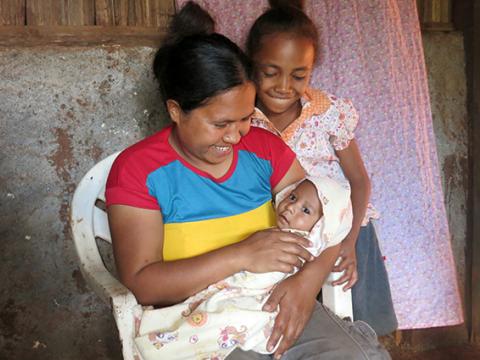Health advice helps protect newborn child from malaria

The great fear that Maria Veronica de Sousa has for her three-month-old son is that he might contract malaria. Sergio de Sousa sleeps under a mosquito net, the first of Maria’s five children to do so.
‘One of my daughters had malaria when she was two months old,’ Maria says. ‘She had a fever and her skin was red and scratchy. If I hadn’t got her to hospital I think she would have died.’
The girl is now a healthy five-year-old at school. Maria is determined that her new son won’t catch the killer disease and she carefully follows the measures she’s learnt to help prevent it.
The mosquito nets are distributed as part of a government health program, and just as important for Maria is the health advice from World Vision staff who visit her village of Uma-ana-ico once or twice a month.
‘We get rid of any empty cans and containers that mosquitoes might live in. We don’t hang clothes on the wall because mosquitoes like to hide in them, we get rid of loose water lying around and we make sure all our water containers have lids.’
Maria, 30, is one of 10 members of the Uma-ana-ico Mothers’ Club. World Vision set up the club as part of the Maternal and Child Health project, funded by Australian Aid, which began in the village 3½ years ago.
The women have watched DVDs on hand washing and breastfeeding, and along with the health education has come practical equipment such as baby clothes and plastic buckets. The baby’s clothes are washed every day but it’s a challenge to keep everything clean in a home with a red dirt floor.
Her husband Mouzinho Freitas, like most men in the village, is a farmer who grows crops such as cabbages, chilli, beans and mustard. Maria has learnt about the benefits of adding these vegetables to the family’s staple meals of rice and cassava.
The village lies in the hills of Venilale sub-district behind the coastal centre of Baucau. An ambulance drove Maria one hour to a health post in Venilale town to give birth to Salju.
‘It was a difficult birth,’ she says. ‘My cord was wrapped around the baby’s neck but luckily there was a woman doctor on hand.’
Maria began breastfeeding immediately and plans to feed Sergio breast milk only for his first six months. Three of her children have been born in Venilale and two in Baucau Hospital, a rarity in a country where only three women in 10 have skilled medical staff in attendance when they give birth.